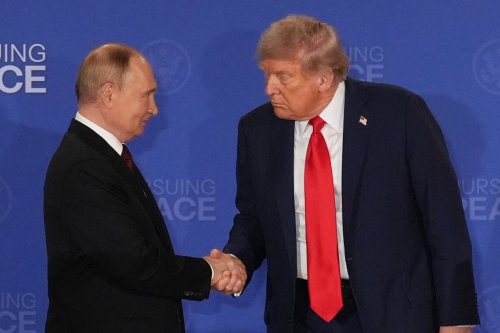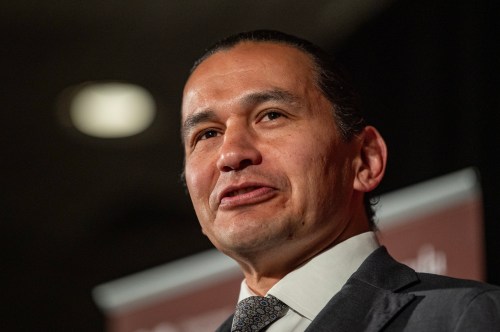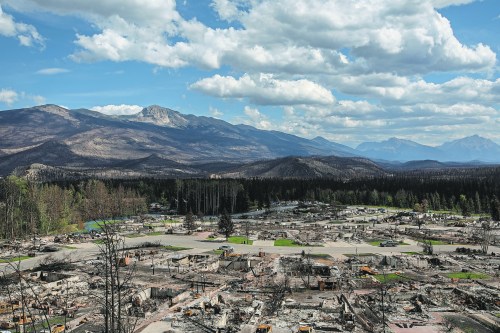Advertisement
Opinion
Moudakis Cartoon

Today’s editorial cartoon
Advertisement
Weather
Brandon MB
-13°C, Clear
Derzhavnost and ‘respect’
By Gwynne Dyer 4 minute read PreviewDerzhavnost and ‘respect’
By Gwynne Dyer 4 minute read Yesterday at 10:47 PM CSTThe Russian word “derzhavnost” is usually translated as “great power status,” but the real meaning is closer to the gangland concept of “respect.” The word was beyond the reach of my feeble Russian vocabulary until I heard it about 20 times in 20 minutes while interviewing an ultranationalist ideologue called Aleksandr Dugin about 20 years ago.
He was then popularly known as “Putin’s brain,” although his role was always to provide philosophical justifications for what the Russian dictator wanted to do anyway, not to give him policy guidance. Vladimir Putin already had the attitudes of somebody who grew up poor and short on the mean streets of Leningrad, where “respect” meant everything.
Dugin is still around, although he is probably no longer in close touch with Putin. But he’s still in play, and in a CNN interview last March, he claimed that Trump’s America has a lot more in common with Putin’s Russia than most people think: “The followers of Trump will understand much better what Russia is, who Putin is and the motivations of our politics.”
Well, yes, of course. As the Kremlin spokesman said of Trump’s new National Security Strategy, published two weeks ago, “The adjustments that we see correspond in many ways to our vision.” That vision is a deeply traditional version of nationalism which includes the conviction that the great powers have the right to command all the others.
ReadU.S. President Donald Trump (right) shakes the hand of Russian President Vladimir Putin during a joint press conference in Alaska on Aug. 15. Perhaps, columnist Gwynne Dyer writes, the two leaders have identical 19th-century views about how the world should work, at a time when almost everybody else sees it differently.(The Associated Press files)

Grateful for cancer treatment in Brandon
2 minute read PreviewGrateful for cancer treatment in Brandon
2 minute read Yesterday at 10:34 PM CSTI have just completed six weeks of radiation treatments and five sessions of chemotherapy.
I had my first set of chemo in Russell and was treated royally by the staff in their cancer care unit. With the start of radiation it made more sense to have both in Brandon as Russell is not equipped to do radiation.
The staff at the reception area in the Western Manitoba Cancer Centre are superb and make sure that you always know where you need to be. Radiation and chemotherapy are staffed by people who care about you, are very friendly, upbeat and all seem to enjoy their jobs. The volunteers make sure you have water, juice or coffee as well as a great lunch.
I drove back and forth to Brandon on the days that I only had radiation, but stayed at Murray House when I had both. I was lucky with the weather driving but really enjoyed staying at Murray House. Staff are exceptional and the facility is perfect and quiet, which is what you need during these treatments. Also, it is walking distance from the WMCC and you don’t need security to get there. The visits with a doctor were always handled very efficiently by both doctor and staff. Everyone in every department was friendly and knew their job.
ReadChristmas spirit is all around us
4 minute read PreviewChristmas spirit is all around us
4 minute read Yesterday at 10:40 PM CSTIt can be easy for people to be discouraged these days.
For it’s easy to find the darkness. It pokes and prods at us daily as we bear witness to world events, serving only to remind us of the shadows that can dim our spirits if we’re not careful.
The Russia-Ukraine war rages on with more than a million people, many of them civilians, dead or wounded. While many European nations are becoming increasingly concerned about the growing threat of Russian military action against them in the foreseeable future, other deadly conflicts continue to claim lives and destabilize nations throughout the world.
So too, military action by the American armed forces against Venezuela appears imminent, despite no credible justification for the taking of such a step.
ReadA waste of time and tax dollars
4 minute read PreviewA waste of time and tax dollars
4 minute read Updated: Yesterday at 11:51 AM CSTManitoba Premier Wab Kinew says his government plans to order a public inquiry be held into the post-election actions of the former Progressive Conservative government regarding the failed Sio Silica sand mining proposal.
It’s a bad idea, dripping in partisan politics.
Manitobans will recall that former premier Heather Stefanson and two of her then-cabinet ministers, Cliff Cullen and Jeff Wharton, were accused in 2023 of exerting pressure on other government officials to have Sio Silica’s proposed environmental licence approved and issued during the “caretaker period” that existed between the Oct. 3, 2023 election and the swearing-in of the new NDP government led by Kinew two weeks later.
They will also recall that a member of the NDP caucus filed a complaint regarding the incident with Manitoba ethics commissioner Jeffery Schnoor regarding the matter and that, after conducting a lengthy investigation, Schnoor determined that Stefanson, Cullen and Wharton had each violated Manitoba’s conflict of interest laws by pushing to have the licence approved after losing the election.
ReadHow disinfectants contribute to antimicrobial resistance
By Milena Esser 5 minute read PreviewHow disinfectants contribute to antimicrobial resistance
By Milena Esser 5 minute read Monday, Dec. 22, 2025During the COVID-19 pandemic, disinfectants became our shield. Hand sanitizers, disinfectant wipes and antimicrobial sprays became part of daily life. They made us feel safe. Today, they are still everywhere: in homes, hospitals and public spaces.
But there’s a hidden cost. The chemicals we trust to protect us may also inadvertently help microbes evolve in their resistance and protect themselves against antibiotics.
QACs: The chemicals in most disinfectants
Among the most common active ingredients in disinfectants are quaternary ammonium compounds (QACs). They are found not only in the wipes, sprays and liquids we use to clean surfaces at home and in hospitals, but also in everyday products like fabric softeners and personal care products.
ReadThe post-truth era in 2025
By Colin Shaw 6 minute read PreviewThe post-truth era in 2025
By Colin Shaw 6 minute read Sunday, Dec. 21, 2025Forty-four per cent of Canadians get their news from social media accounts unaffiliated with any scientific, government, or news organization, according to a 2023 survey from Statistics Canada. The rising use of social media as a source of news is just one example that exhibits the paradigm of post-truth.
Oxford Languages defines post-truth as “relating to or denoting circumstances in which objective facts are less influential in shaping public opinion than appeals to emotion and personal belief.” The term has gained popularity to remark on the apparent erosion of truth that has developed since the turn of the century.
Given the modernity of the phenomenon, it is appropriate to analyze some of the events of the past year that demonstrate its prevalence. The following paragraphs illustrate the extent to which the continuous growth of social media and AI, and the rise of anti-intellectualism have resulted in the devaluation of truth, and how this reflects a rather uncomfortable characteristic of human nature.
On Dec. 11, Time Magazine declared the person, or rather people, of the year to be “the architects of AI.” The cover of the issue pictures multiple tech giants, like Jensen Huang and Elon Musk, sitting above New York City, recreating the famous “Lunch atop a Skyscraper” photo. It’s clear that AI is considered one of the most impactful developments in the past few years, and for good reason. Artificial intelligence is transforming the lives of people in virtually every sector and steadily becoming a tool that is used in most aspects of daily life. According to a survey conducted by the Pew Research Center, 27 per cent of U.S. adults say they interact with AI several times a day, while AI experts think the number is more like 79 per cent.
ReadGlobal politics as we enter 2026
By Kyle Volpi 4 minute read PreviewGlobal politics as we enter 2026
By Kyle Volpi 4 minute read Sunday, Dec. 21, 2025The U.S. has dominated the rules-based global order for the past 75 years. But now, Washington “has chosen to walk away from the international system,” Ian Bremmer, head of the Eurasia Group, said recently in his annual state-of-the-world speech. “Not because it’s weak, not because it has to — because it wants to.”
It’s a bizarre historical precedent. And the implications for the global balance of power will be profound.
Russia’s full-scale invasion of Ukraine ap-proaches its fourth year shrouded in uncertainty. A corruption scandal has rocked Ukraine’s government, forcing President Volodymyr Zelen-skyy’s chief of staff to resign. Kyiv is meanwhile scrambling to stall White House negotiators from brazenly tilting ceasefire talks in Vladimir Putin’s favour. The Russian leader refuses to compromise, convinced he is winning on the battlefield.
Indeed, Russian forces are advancing but at glacial speed. The Kremlin is achieving this partly through strengthening drone capabilities. But also, maintaining a grotesque disregard for its troops, mindlessly throwing them into the buzzsaw of Ukraine’s AI-powered defences. Ukrainian authorities say Russia is now losing 1,000 soldiers a day to gain less than five kilometres of territory per month.
ReadUkrainian street artist Maxim Kilderov stands by his painting containing symbols and messages of resistance in his private museum that displays a collection of battlefield artifacts documenting Russia’s invasion of Ukraine in Kyiv, Ukraine, on Tuesday. Russia’s ongoing invasion Ukraine is just one example of the challenges the world faces as it moves into 2026, writes Kyle Volpi Hiebert. (The Associated Press)

Climate falsehoods are a national security threat
By Sadaf Mehrabi 5 minute read PreviewClimate falsehoods are a national security threat
By Sadaf Mehrabi 5 minute read Sunday, Dec. 21, 2025When a crisis strikes, rumours and conspiracy theories often spread faster than emergency officials can respond and issue corrections.
In Canada, social media posts have falsely claimed wildfires were intentionally set, that evacuation orders were government overreach or that smoke maps were being manipulated. In several communities, people delayed leaving because they were unsure which information to trust.
This wasn’t just online noise. It directly shaped how Canadians responded to real danger. When misinformation delays evacuations, fragments compliance or undermines confidence in official warnings, it reduces the state’s ability to protect lives and critical infrastructure.
At that point, misinformation is no longer merely a communications problem, but a national security risk. Emergency response systems depend on public trust to function. When that trust erodes, response capacity weakens and preventable harm increases.
ReadHow to keep your cheer this holiday season
By Joanna Pozzulo 5 minute read PreviewHow to keep your cheer this holiday season
By Joanna Pozzulo 5 minute read Sunday, Dec. 21, 2025The holidays can be filled with joy and positive emotion, but they can also be a time when stress is in overdrive. To-do lists can be long, with little time for personal well-being.
About 50 per cent of Canadians report December as the most stressful month of the year, with women 40 per cent more likely to have stress due to pressure to manage holiday preparations. Over the season, women report changes in sleep quality, dietary choices and mental health.
Although financial concerns are common over the holiday season, this year a significant number of Canadians are feeling an even greater strain with rising costs and job insecurity. Two-thirds of Canadian parents are concerned about managing costs over the holidays.
People may also experience family strain and conflict over the holidays, giving rise to feelings of loneliness and sadness. Past family dynamics may be triggering and open up old wounds. Changes in family composition may be felt more during the holidays. Grief over loss can also be intensified.
ReadLOAD MORE







